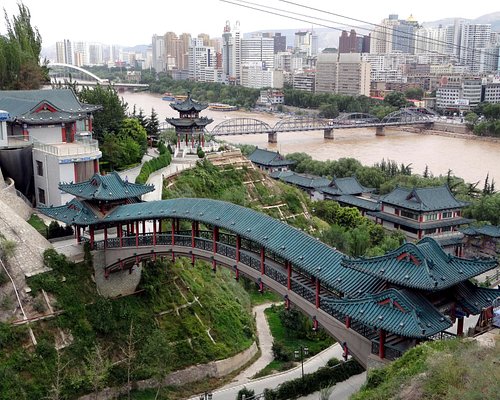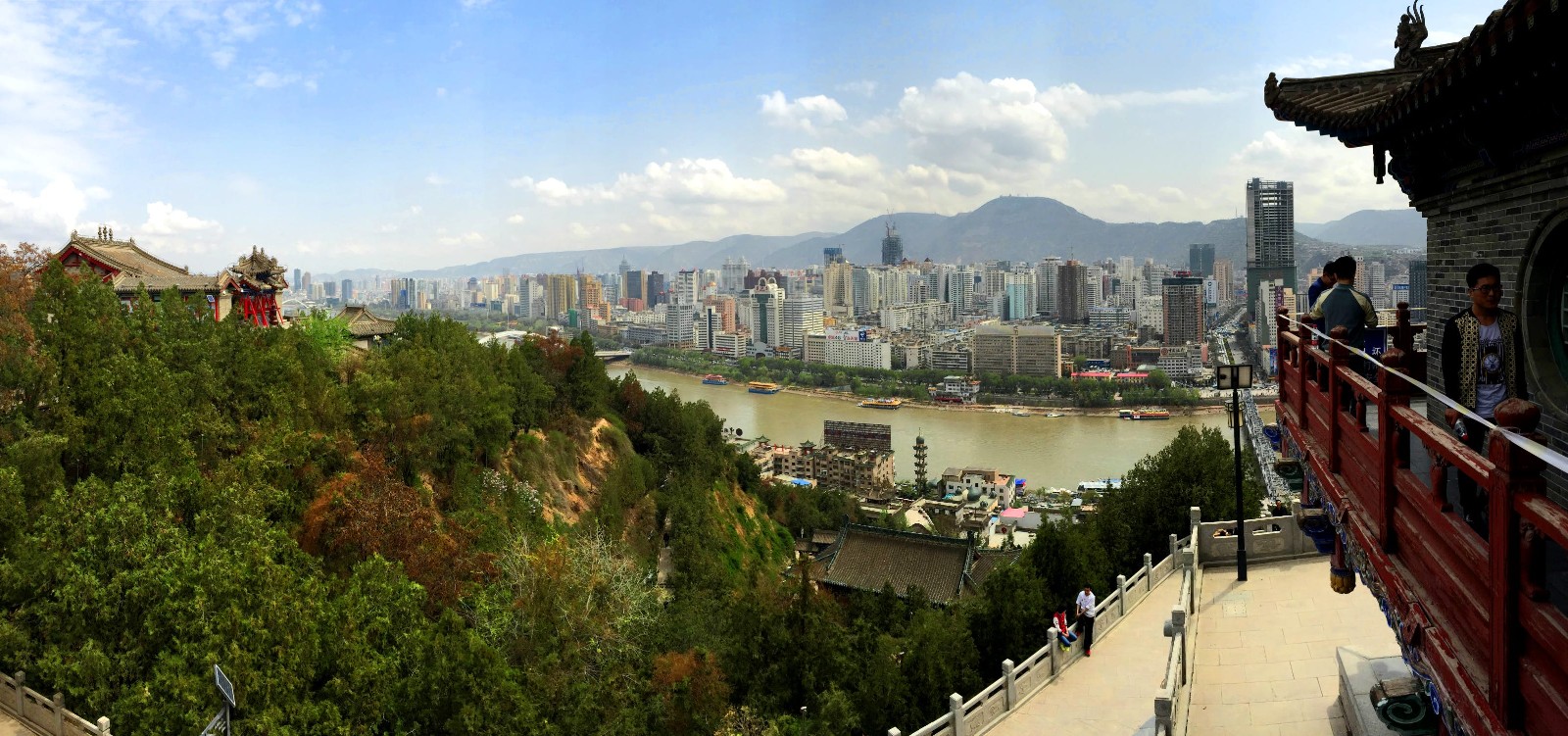Lanzhou Institute of Technology (Gansu)
Lanzhou City - connecting East and West on the silk road
Lanzhou (Lanchow) is an administrative center of Gansu province, located in the heart of China. The city itself lies on the Huang He riverside, surrounded by high mountains. The city population approximates 3,150,000 people. Lanzhou is an important industrial center. The Lanzhou’s industry is represented by various sectors: chemical, engineering, oil-refining, cloth manufacturing, tobacco and leather industries, etc.



Furthermore, the advantageous location of Lanzhou makes the city an important road junction, connecting the eastern and western parts of China. That is precisely why, in old time, Lanzhou became an important strategic and trade center on the Great Silk Road. Lanzhou was the only large city on the vast 1,600-km section of the Silk Road. In ancient times the city was known for its market, one of the largest in China where goods from all over the world could be found. Every day dozens of caravans carrying silk, precious stones, greenstones, gunpowder, and paper crossed the city.
The Lanzhou history is associated with the history of the Great Silk Road. This interrelation was brightly reflected in the famous Binhe Park, situated in the northern part of the city along the Huang He riverside. There, among flowerers and various trees one can see sculptures of pilgrims wandering along the Silk Road or a group of camels loaded with packs of precious goods. Here and there, the park’s visitors can enjoy small sculpture compositions, narrating about the centuries-long history of Lanzhou city.
The history of the city itself numbers about 2 millennia. The first written records date back to 778 BC. During the ministry of the Han Dynasty (206 BC - 220 AD) Lanzhou was known as “Yunyu”, which means “Golden City”. By that time it was already one of the most beautiful cities of China. Following the fall of the Tang Empire in 763, the city fell under control of Tibet, in 1235, and like the major part of Northern China it was subject to Mongolian invasions.
Lanzhou impresses not only with the city’s historical part but also with its gorgeous landscapes. The Gaolanshan summit in the city’s southern part is occupied by Lanshan Park which stretches for 10 km. The park was completely destroyed during Japanese occupation; upon the city liberation, it had the only tree left on the mountain top. The townsmen made every effort to restore the park anew and today it is one of the most picturesque places in Lanzhou.
Another sight of the city is the White Pagoda built under the Min dynasty (XV) on the northern riverside of Huang He. The 17-m high Pagoda consists of 7 levels. Equally impressive is Five Springs Park based on a park which is considered a resting place for the townsmen as long as 2,000 years. This is not just a resting place but also a historical and cultural reserve whose territory also famous for several temples, including the Chungking Temple, War Bridge and Zhongshan Memorial Hall.
Lanzhou is rightfully considered a cradle of Chinese civilization. Its advantageous location, rich history, natural climatic conditions make the city one of the most attractive tourist places in China.

Lanzhou Institute of Technology (LZIT) is a full-time engineering institute under the direct jurisdiction of Gansu Province. Initially known as the Peili Polytechnic School founded in 1942, the institute was transformed into Gansu Mechanical Manufacturing Secondary School in 1958. In 1962, it was merged with five other technical secondary schools (the original Coal Technical Secondary School, Power Technical Secondary School, Light Industry Technical Secondary School, Heavy Industry Technical Secondary School, and Telecommunication Technical Secondary School) to form a new school, Gansu Technical School, which was later renamed Lanzhou Technical School in 1974. In 1989, the school was transformed and renamed Lanzhou Polytechnic College. In 2012, the National Ministry of Education approved the upgrading of Lanzhou Polytechnic College to a degree-awarding institution – Lanzhou Institute of Technology.
LZIT is located in Lanzhou, the capital city of Gansu Province. The campus of the institute covers a total area of 1, 128, 193. 33 square meters, with a campus building area of 298.2 thousand square meters. The fixed assets of the institute are 556 million RMB, of which the teaching instruments and equipment amounts to 93.1 million RMB. The library has a collection of 781.6 thousand volumes. LZIT now has a total enrollment of 10,127 full-time students and over 3,000 adult students.
The institute boasts a qualified faculty of 646,including 529 full-time teachers, among which are 264 teachers with senior professional titles (sixty-six professors) and 356 teachers with master’s degree or above (sixty-eight teachers with doctor’s degree).LZIT has one national-level teacher, one national-level teaching team, five provincial-level teachers, three provincial-level teaching teams, one provincial leading talent, eleven winners of provincial “Gardener Prize”, one winner of the May 1 Labour Medal, one provincial excellent expert, twenty-three teachers granted the provincial Young University Teachers Talent Award, three Teachers granted the Morality Models of Gansu Province, and two provincial “Technology Experts”.
LZIT is composed of fifteen schools & centers, namely the School of Mechanical Engineering, School of Electrical Engineering, School of Civil Engineering, School of Software Engineering, School of Electronic Information Engineering, School of Materials Engineering, School of Automotive Engineering, School of Economics and Management, School of Art and Design, School of Humanities and Social Science, School of Foreign Languages, School of Continuing Education, as well as Centers for Basic Subjects, Physical Education, and Engineering Training. It offers nineteen undergraduate programs, and twenty-five three-year-programs, covering the five disciplines of engineering, management, economics, literature and arts. The current professional system is characterized by such majors as Machinery, Electronic Information, Materials, Civil Environment, Communication and Transportation and Economic Administration, aiming to provide assistance to the equipment manufacturing industry of Gansu province and the regional newly-developing industries. .
The institute has been consistently keeping teaching as the central task and advancing the construction of quality engineering. In the recent years, a series of reforms and explorations on talent cultivation, curriculum system, teaching contents and methods, practical teaching, as well as textbook construction, have been carried out and gained great achievements. Up to now , it has been granted one second award for national teaching achievement, two first awards and nine second awards for provincial teaching achievement, thirty-seven awards for office-level teaching achievement. It boasts two national excellent courses, twenty-nine provincial excellent courses and fifty-nine institute-level excellent courses. Centers for the Mechanical Engineering Experimental Teaching and Electric Engineering and Automation Experiment are rated as the “Experimental Teaching Demonstration Center of the Gansu Institutes of Higher Education”.
The institute has been working hard to carry out scientific studies and improve its academic research proficiency. About 275 projects has been approved, among which eight were approved by National Natural Science Foundation of China, one by the National Social Science Foundation of China, fifty-one by the provincial science and technology project. Eighty-seven projects were granted the Award for Science and Technology Advancement (seven), an Award for Social Science Advancement, an Award for Science and Technology Advancement of Gansu Institutes of Higher Education, and an Award for Social Science Advancement of Gansu Institutes of Higher Education respectively. To date, Forty-five patents have been obtained. Teachers have published 3,200 research papers in total, of which 231 were covered by SCI, EI and ISTP.
The institute has been making great effort to promote the conversion and application of scientific and technological achievements. For example, great breakthroughs have been made in the pragmatic innovation projects of mechanical equipment and advanced materials. Two superior products, metallurgy conveying equipment and metallurgy smelting and casting mold were developed and still remain ahead in the market, which has enjoyed great economic and social benefits. “The Collaborative Innovation Center for Advanced Manufacturing of Machinery Equipment in Gansu” was approved as the “2011 Collaborative Innovation Center. “The Lab for Resources and Environment Information Engineering in Gansu” is a provincial-level engineering lab. Two labs, namely the “Lab for Green Machining Technology and its Application, and “The Lab for the Operation of E-Business” are rated as key laboratories among universities and colleges in Gansu. “The Development and Research Center for Industries Back-nurturing Agriculture in Gansu New Type Urbanization” is listed as the key cultivation base for Humanities and Science among institutes of higher education in Gansu Province.
The institute has an engineering training center which can meet students’ needs for multi-type comprehensive training, such as lathing, milling, planning, grinding, gripping, welding, casting, and numerical machine processing. There are seventy key laboratories for machinery measurement, robot, PLC, automatic control and so on, as well as thirty-eight on-campus training bases for mold stamping, flexible manufacturing practice, and integration automation of Electric System. It also boasts of one national center for vocational skills identification, and eight training centers for vocational skills. Besides these, ninety-six school-enterprise cooperation bases have been established with Lanshi Group, Xuji Electric Group, China Telecom Gansu Branch, Bazhi Construction Group Co., Ltd., Tianshui Xinghuo Machine Tool LLC, and Beijing Sanyuan Sojitz Food Logistics Co., Ltd.
Adhering to the idea of open-schooling, the institute has been actively establishing extensive ties for international communication and cooperation with the world. So far, the institute has built cooperative relationships with over twenty universities and research institutions in ten countries and regions, including the United Kingdom, Germany, Canada, the United States, Australia, New Zealand, Slovenia, Switzerland, Japan, and Cuba. Great efforts have been made to implement projects that provide undergraduates, core teachers and teaching administrative staff with the chances to study, exchange, and do research overseas. Hundreds of foreign experts have been invited to the campus to give lectures. As one of the six pilot colleges to be transformed, the institute has launched projects for exchange and cooperation with University of Applied Sciences Northwestern Switzerland; and established inter-school, school-enterprise, industry-academy cooperation with national key universities and enterprises at home so as to accelerate our rate of transformation. The institute has also started and taken part in the university strategic alliances for “One Belt and Road Initiative”, aiming at supporting the economic and social development of countries and regions along the route.
The institute gives first priority to students’ skill training and has improved greatly in the quality of talent cultivation. In recent years, LZIT students have collected awards in a wide range of subjects & skill competitions, including the National Undergraduate Electronic Design Contest, “Challenge Cup” National University Student Academic Paper & Science and Technology Work Competition, and National English Contest for College Students, among which there are eight first prizes, twenty-nine second prizes, thirty third prizes at national level, and 789 provincial-level prizes. A survey conducted by the Department of Human Resources and Social Security of Gansu, reveals that graduates of LZIT enjoy a favorable reputation among employers for their profound basic knowledge and comprehensive competence, strong practical competence and flexibility. The average rate of graduate employment has remained over 90%.
In the past seven decades of its founding and development, LZIT has always been sticking to its motto of “learn the truth and accomplish the task; cultivate wisdom and pursue virtue”, carrying forward the schooling philosophy of diligence, resilience, simplicity, generosity, tolerance, innovation, harmony, and persistence, as well as abiding by the education tenet of unity of the knowing and doing, teaching and researching, mind and hands, business startup and employment obtaining. By virtue of the great achievements that it has made in the aspects of cultural inheritance, talent cultivation, scientific research, and also social service, the institute can thus guarantee the regional economy and social development with sophisticated intellect and talent. LZIT was awarded honorary titles such as “National Outstanding College for Vocational Education”, “Role Model in Ethical and Cultural Progress of Gansu” and “National Role Model in Ethical and Cultural Progress” by the National Ministry of Education, the Central Guidance Commission for Building Spiritual Civilization of the CPC, the Chinese Communist Youth League, and the CPC Committee of Gansu.
By firmly holding the great banner of socialism with Chinese characteristics, we will implement the guidance of Deng Xiaoping’s Theory, the Theory of Three Represents, and the Scientific Outlook on Development, study the guiding principles of the 18th National Congress of the CPC, the third, fourth, and fifth plenary sessions of the 18th CPC Central Committee, and General Secretary Xi Jinping’s major policy addresses, and abide by the development and management laws of higher education. Under the joint support of the Party Committee and government of Gansu, we will consistently adhere to the principles of servicing business in the west, quality promotion and featured cultivation, to the strategy of institution prosperity by quality, talents, culture. We will strive for the transformation of LZIT into a predominant applied technology university with distinguishing features and advantages, which in turn is expected to make significant contributions to the local economic and social development! (Data updated until April, 12, 2016.)
Contract Period: 1st Sep, 2026 - 31st Aug, 2027
1st Mar, 2027 - 31st Jan, 2028
Requirements: Bachelor degree + teaching experience (TEFL Cert. preferred)
Monthly Salary: 10,000 RMB or above (negotiable)
12 months pay
Teaching hours: 14-16 teaching hours per week
Paid Holidays: Two days off per week; all public holidays in China. Paid winter holiday in Jan and Feb and summer holiday in July and Aug for one school year contract
Medical Insurance and incident insurance: The university will buy insurance for teachers
Accommodations: Offering a private free apartment including 2-3 bedrooms, living room, washing room, color TV, internet access, air conditioner, refrigerator, washing machine, telephone, microwave, bedding etc. a certain amount of free household electricity and water .
International air ticket: On the completion of one school year contract, the school will reimburse the round-trip airfare.
Closest Airport: Lanzhou Zhongchuan International Airport. The teacher will be picked up by the school on arrival and transported to the airport on departure.
Working visa: working permit nortification will be e-mailed to teacher to process work visa in his/her own home country before departing for China. Teachers already in China will be assisted in switching over to the university.